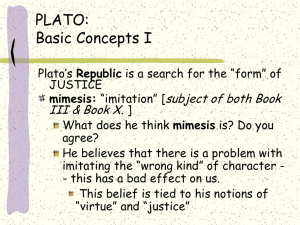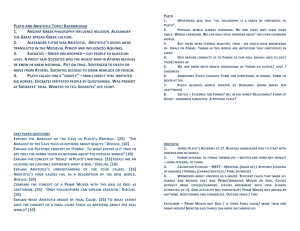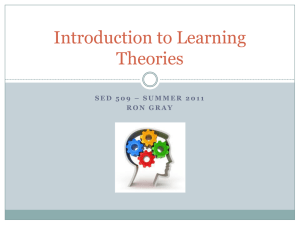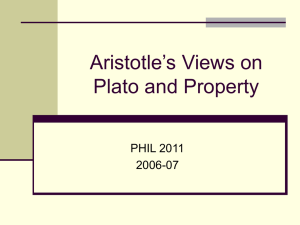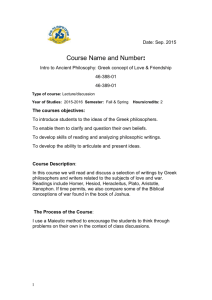Plato vs. Hume: A Philosophical Comparison Essay
advertisement
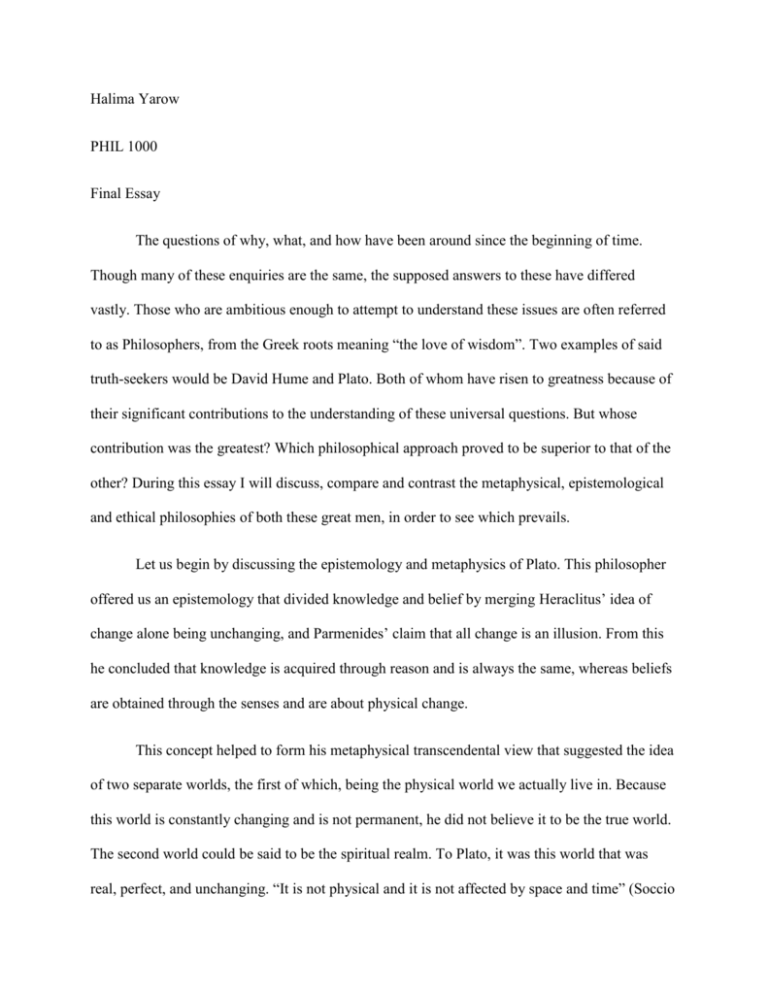
Halima Yarow PHIL 1000 Final Essay The questions of why, what, and how have been around since the beginning of time. Though many of these enquiries are the same, the supposed answers to these have differed vastly. Those who are ambitious enough to attempt to understand these issues are often referred to as Philosophers, from the Greek roots meaning “the love of wisdom”. Two examples of said truth-seekers would be David Hume and Plato. Both of whom have risen to greatness because of their significant contributions to the understanding of these universal questions. But whose contribution was the greatest? Which philosophical approach proved to be superior to that of the other? During this essay I will discuss, compare and contrast the metaphysical, epistemological and ethical philosophies of both these great men, in order to see which prevails. Let us begin by discussing the epistemology and metaphysics of Plato. This philosopher offered us an epistemology that divided knowledge and belief by merging Heraclitus’ idea of change alone being unchanging, and Parmenides’ claim that all change is an illusion. From this he concluded that knowledge is acquired through reason and is always the same, whereas beliefs are obtained through the senses and are about physical change. This concept helped to form his metaphysical transcendental view that suggested the idea of two separate worlds, the first of which, being the physical world we actually live in. Because this world is constantly changing and is not permanent, he did not believe it to be the true world. The second world could be said to be the spiritual realm. To Plato, it was this world that was real, perfect, and unchanging. “It is not physical and it is not affected by space and time” (Soccio @131). In both worlds exists what Plato calls “Forms”. It is hard to say exactly or describe perfectly what a Form is, much like the concept of the Tao that the Asian Sages believed in. What can be said about them, however, is that they are each a “pure, unmixed essence that exists independently of human consciousness… Although the Forms actually exist, they are not physical objects” (Soccio @132). Plato showed excellently his ideas through 3 concepts: The Allegory of the Cave, The Dividing Line and The Simile of the Sun. Up until this point, I enjoyed everything Plato had to discuss. Where I believe he fails is when he speaks of innate ideas. I too believe in this concept, but only to a certain extent. According to Plato, these innate ideas originate from a prior life. How could this be? Is it not already confusing enough to have a dualistic system for this world, but now there is also a prior one? I believe this is where he lost me. Not only this, but Plato did not believe in relativism at all. This is the idea that there is no absolute universal knowledge of the truth. Plato basically believed there to be only one truth to any matter. For example, a girl is pretty not because one would think so, but because universally, that’s what “pretty” is. To Plato, beauty was not in the eye of the beholder. Another example is that of art. This is perhaps one of the most difficult things for there to be just one opinion of. Art comes in all different shapes, forms, sizes and color. There couldn’t just be one universal critique of all the different designs. But to Plato there is. Beside these couple of points, I would say that Plato’s epistemology and metaphysics could be flawless. But to find a philosopher that could be considered unflawed is a difficult task. Unfortunately, to me, David Hume did not come close to being unflawed. In comparison to me liking just about everything Plato had to discuss, I only like few things that Hume had to say. His epistemology centered on the idea of experience. This concept, I did however, enjoy very much. In contrast to Plato’s belief in innate ideas, Hume believed that there was no such thing. For one to gain knowledge, experience was needed. “In other words, all ideas can be traced to impressions and thus, are derived from experience…” (Soccio @298). The argument that can be made to anyone who tried to refute this would be the fact that one cannot explain what color is to a blind person. This is because they’ve never experienced it. Color is not an innate idea, it must be experienced to be any type of idea. I believed these claims to be Hume’s strongest points. Another interesting argument Hume makes is the idea of there being no such thing as a “fixed self”. Instead, he argues that we are only a bundle of perceptions. In this Bundle Theory of the Self it is said that “a self is merely a habitual way of discussing certain perceptions.” (Soccio @299). In this idea, Hume reflects some of the same views in which Buddha had. This concept, to me, makes sense. But who’s to say there needs to be a “fixed” self for you or me to be the same person? Just because I am different looking and more educated than I was in second grade, does not mean that I’m not that same individual. I believe his argument is an interesting logical one, but it doesn’t not particularly sway me. One must only recall the idea of Entelechy, from that of Aristotle, or even the Tao, from the Asian Sages, that literally translate to “the Way”. Both of these concepts suggest that we are always going to be ourselves. We may start off with a beginning and go through life, changing and expanding, but we end still as ourselves. Hume’s ideas went against this, and as a result, is a weakrer philosopher in my opinion. So far, we have discussed the metaphysical and epistemological strengths and weaknesses of both Hume and Plato. But what of their Ethical approaches? Plato’s most famous book, The Republic, introduces us to two views of morality. One of which emphasizes that “right and wrong must be determined by the consequences our acts produce” while the other claims “that they can be understood only in terms of their effect on our overall functioning as human beings” (Soccio @146). Plato argues for what is called a functionalist theory of morality, in which everyone and every thing has a purpose, and can only be happy when they find that purpose and live a fully functional life. This idea fits perfectly into Plato’s idea of a perfect society. He believed that a reciprical relationship should exist between an individual and the kind of society they live in. His ideal society was a Republic. In which only a few “philosopher kings” were entitled to rule, because they were the only ones who were actually fit. This society would have workers, warriors, and guardians. Each individual would fall into a category that was their natural place. This would create an ideal state where indivduals acted in relation to eachother and ensured long term happiness by preforming their duties to society. Along side this, Plato listed four virtues that were also necessary for an ideal happy society. These were called the Cardinal Virtues. First there was Temporance, which was self control or modertaion from each individual. Second, there was Courage, which is necessary for one’s protection. Third, there is Wisdom, which is necessary for training and guidance. And lastly, there is Justice, which balanced and allowed functioning for the whole. Plato concluded that if everyone were to practice these virtues and act in accordance to their natural duties, they would all live genuinely happy in an ideal society. When it comes to Ethics, I would say Plato had a very spot-on approach. Sadly, I cannot see it being very realistic. The idea of a perfect society where everyone is content in what they do and contribute sounds like a beautiful one. But I doubt this is impossible for human nature. I do not believe that settlement is something we as a people are usually okay with. Although Plato rejected the idea of Henonism- which is the pursuit of only pleasures and never pains- I believe that this philosophy is usually what people lean more towards. Unfortunately we are a selfish society, and selfish individuals. For me, however, I believe Plato had a good idea of why Hedonism was a fallacy. He made the example of this using one of the greatest pleasures, which is eating and drinking. He stated that in order for one to enjoy dining, they must first experience hunger. There must exist pain for pleasure to actually be just that… pleasure. To me, this makes perfect sense, and completes Plato’s ethical philosophy excellently. Hume has a very different view of ethics, as any prominent skeptic might. He believes that “reason is and ought to be a slave of the passions”. Basically what this means is that reason alone is not able to motivate us to do anything. He argues that we need passion to be over and above reason for us to actually do it. Ultimately, I would say that for the most part, this is true. When we are passionate about something, it is more likely to get done. However, I do not believe that any action that someone takes, that could be considered ethical, is soley just because of their own selfish wants or passions. This assumtion could easily be conluded from Hume’s argument. Reason should and can be a slave to passion, but does not neccesarrily have to be. Both Plato and Hume had excellent points in their Metaphysical, Epistemological and Ethical approaches to their individual philosophies. Though I have disagreed with many of Hume’s philosophical views, I still understand and find brilliance in many of his concepts. However, I think it can be easily said that Plato had the superior philosophical system. Hume’s notable skepticism and fierce empiricism was just a little too much for my fancy. This, to me is where many of his weaknesses came from. Plato, on the other hand, appealed to me very much. His outrageous ideas and complete openness to different concepts and views of metaphysics and epistemology is indeed what set him above Hume and allowed him to be noted in history as one of the greatest Philosophers of all time. Works Cited Soccio. Archetypes of Wisdom 8th edition. Wadsworth, 2010.


